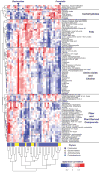Linking long-term dietary patterns with gut microbial enterotypes
- PMID: 21885731
- PMCID: PMC3368382
- DOI: 10.1126/science.1208344
Linking long-term dietary patterns with gut microbial enterotypes
Abstract
Diet strongly affects human health, partly by modulating gut microbiome composition. We used diet inventories and 16S rDNA sequencing to characterize fecal samples from 98 individuals. Fecal communities clustered into enterotypes distinguished primarily by levels of Bacteroides and Prevotella. Enterotypes were strongly associated with long-term diets, particularly protein and animal fat (Bacteroides) versus carbohydrates (Prevotella). A controlled-feeding study of 10 subjects showed that microbiome composition changed detectably within 24 hours of initiating a high-fat/low-fiber or low-fat/high-fiber diet, but that enterotype identity remained stable during the 10-day study. Thus, alternative enterotype states are associated with long-term diet.
Figures



Comment in
-
Microbiology. The guts of dietary habits.Science. 2011 Oct 7;334(6052):45-6. doi: 10.1126/science.1213799. Science. 2011. PMID: 21980098 No abstract available.
References
Publication types
MeSH terms
Substances
Grants and funding
- UH2 DK083981/DK/NIDDK NIH HHS/United States
- T32 GM008759/GM/NIGMS NIH HHS/United States
- K24 DK078228/DK/NIDDK NIH HHS/United States
- P30 DK050306/DK/NIDDK NIH HHS/United States
- HHMI/Howard Hughes Medical Institute/United States
- S10 RR024525/RR/NCRR NIH HHS/United States
- R01 AI39368/AI/NIAID NIH HHS/United States
- T32 GM142607/GM/NIGMS NIH HHS/United States
- UL1RR024134/RR/NCRR NIH HHS/United States
- K24-DK078228/DK/NIDDK NIH HHS/United States
- R01 AI039368/AI/NIAID NIH HHS/United States
- S10RR024525/RR/NCRR NIH HHS/United States
- UL1 RR024134/RR/NCRR NIH HHS/United States
LinkOut - more resources
Full Text Sources
Other Literature Sources
Medical
Molecular Biology Databases

